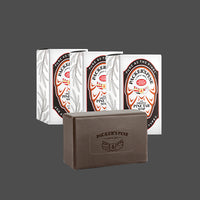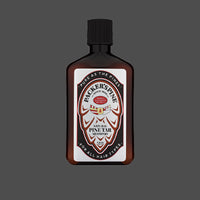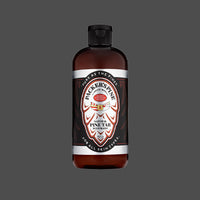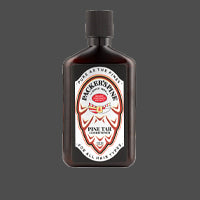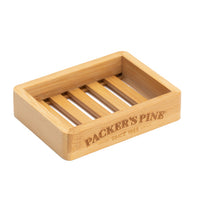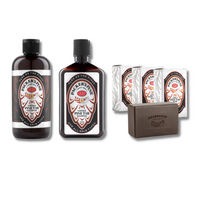Pine Tar Soap for Flaky Skin

If you have flaky skin, you probably feel that it is more than just a minor irritation—despite what your friends or healthcare provider might say! Flaky skin on hands makes you look (and feel) older than you are. Dry, flaky feet look unsightly in sandals during the warmer months. Dandruff is just straight up embarrassing. Dry facial skin seems like it can never get enough hydration, no matter what you do. And flakiness almost inevitably comes with itchiness, and that is a vicious cycle.
Wouldn’t it be great if there were a cleanser that you could use daily on all of these areas—one that is strong enough to cleanse the skin thoroughly of dirt and bacteria but gentle enough to soften and hydrate skin with every wash? Well, that unicorn is in fact a reality. Pine tar soap for flaky skin is a completely natural, skin friendly soap. It never dries and leaves skin with a moisture barrier that helps keep it clean and protected until the next wash.
The Causes of Flaky Skin
The most obvious causes of flaky skin—cold weather, sunburn, excessive hand washing—are not the only ones. You may need to take stock of multiple areas of your life to find the cause (or causes) of flaky skin and find ways to eliminate it at the root.
Hard water—Mineral buildup from hard water can cause irritation and damage to the epidermal layer. Daily exposure to hard water is enough to cause and perpetuate flaky skin, and it may be such a chronic condition that you never realize your water is a factor. Putting a water filter on your shower head, especially one that adds vitamin C to the shower stream, can go a long way toward eliminating flaky skin.
Very hot showers—You may look forward to a soothing hot shower or bath at the end of the day or after a workout. It feels good, but when it causes skin to dry out and flake, it’s oh so bad. The hotter the water, the more destructive it will be to the natural, protective oils in your skin. Especially in the winter, you will want to take the temperature down to lukewarm—and unfortunately, the quicker you get in and out, the better.
Medical conditions—Those on dialysis may experience chronic dry skin due to the loss of water in the body caused by this (life saving) treatment. Dialysis patients need to be extra diligent about moisturizing their skin at least once a day and always after bathing. Other common conditions that can cause dry skin are hypothyroidism and menopause.
Diabetes—The body may try do deal with excess sugar in the blood by pulling fluid from cells as a way to flush it into the urine for disposal. Skin cells are affected as well, causing dry, itchy, flaky skin. Exercise and maintaining blood sugar at a healthy level can begin to reverse this condition.
Genetic predisposition—There are a few dry, flaky skin conditions that are thought to have a genetic cause. Ichthyosis vulgaris, marked by “fish scales” that can cover parts or most of the surface of the skin, along with garden variety atopic dermatitis may both have a genetic origin.
Heating and air conditioning—Indoor air is dry in the summer as we try to cool off, and even drier in the winter as the constant influence of forced air heating deprives us of necessary moisture. A humidifier will go a long way to keep your skin hydrated and hopefully flake-free. Do not underestimate this very cost-effective solution!
Prescription medications—Antihistamines and medications for acne and high blood pressure may all cause dry, flaky skin.
Skin care products—If you’re suffering from flaky skin, it’s time to start reading the labels on your skin care products. You may notice that your lotion or cleanser contains peroxide, alcohol, salicylic acid, sodium laurel sulfate, synthetic fragrances, benzophenone, and oxybenzone. There are dozens, if not hundreds, of additives to products that are allegedly good for your skin but can cause dryness and flakes. When in doubt, research every ingredient on the label. The fewer ingredients, the better.
Solutions for Flaky Skin
In addition to the solutions mentioned above, there are other proactive steps you can take to treat and prevent dry, flaky skin.
Wear natural fabrics—When you have flaky skin, almost anything can be an irritant. Synthetic fibers like nylon, polyester, and most blends have been treated with multiple chemical processes to create these fabrics, and they never completely leave the garment. Plus, these fabrics are inherently itchy and irritating to your skin. Choose natural fabrics like cotton, hemp, silk, bamboo, and wool instead.
Use pine tar soap for flaky skin every day—If you have flaky skin, pine tar soap is about to become your new best friend. Most of us like to shower every day, but it’s the very soap we use to clean ourselves that can contribute greatly to flaky skin. Pine tar soap solves that problem by being multipurpose. It’s at once antibacterial, antifungal, and antiseptic, but it also has protective, moisturizing benefits that make for a cleaning ritual unlike any other.
Don’t scratch—No one with itchy skin likes to hear it, but scratching begets more flakes. Moisturizing proactively with sugar scrub at least once a day may help to defeat flakes and protect skin from further dehydration, thus preventing itch. Use it after pine tar soap for flaky skin for an extra barrier against the elements.
Don’t scrub—It’s important to use pine tar soap for flaky skin in the shower and even to clean your face to remove dead skin cells, but you want a gentle exfoliation. Skip loofahs, scrubbers, cleansing pads, and even washcloths on sensitive skin. Simply run the bar of soap gently along your skin and lather up with your hands.
Hydrating Skin from the Inside Out
It’s important to take care of your skin from the inside; often, the body talks to us about its internal workings by creating symptoms on the surface. Even if your dry skin is caused by exposure to the elements, a boost from inside is bound to help.
Be aware of what you drink—You may not think about it very often, but some of your favorite morning beverages could be dehydrating you. Coffee and even tea (if it contains caffeine) are dehydrating. It probably goes without saying that alcohol is dehydrating as well—you only need a mild hangover to be reminded of this fact. Focus on drinking quality spring water, or well-filtered tap water, and never leave home without your water bottle.
Eat fruit and vegetables—Fruit and vegetables are vital sources of quality water that are easy for your body to assimilate. Replacing salty, dry snacks with fruit and raw vegetables is a proactive way to prevent dehydration and get quality water into your system.
Eat good fats—Omega 3 fatty acids are vital to skin elasticity and water retention—and overall health. Oily fish, nuts and seeds, and egg yolks are all high in this vital nutrient. Bone broth is helpful to skin health as well, given the quantities of collagen it contains. Avoid most vegetable oils, which contain PUFAs, and all trans fats, as these pollute the body down to the cellular level.
Supplement for skin health—Flaky skin can be an indication that you are lacking key nutrients in your diet that supplementation may correct. Experiment with biotin (a B vitamin) supplementation, probiotics to promote gut health which can impact the skin, fish oil for omega 3s, collagen, or simply a multivitamin to cover all the bases. Add supplements one at a time, and record any changes you observe.
Why Pine Tar Soap Helps Flaky Skin
Pine tar soap has a number of components that clean thoroughly and effectively without stripping the skin. When pine wood is heated to exceptionally high temperatures, a thick, syrupy substance is created that is composed of literally thousands of chemical components. While this “tar” is not perfectly understood, it has been shown again and again to reduce itchy skin and surface inflammation, promote healing from fungal agents, and even to reduce the proliferation of diseased cells in skin afflictions such as psoriasis, eczema, and fungal infections like athlete’s foot.
Historically, pine tar was used on wooden boats to protect them from water infiltration. The same nutritive properties have a nourishing, protective effect on your skin.
Pine Tar Shampoo for Dandruff
Dandruff is one of the most persistent—and the most annoying—forms of flaky skin. You may have tried seemingly endless remedies to get rid of it, to no avail. Packer’s Pine Tar Shampoo is formulated especially for dry, flaky scalp skin. While most anti-dandruff shampoos resort to harsh chemical detergents that scour skin in order to release the flakes, our pine tar shampoo is gentle and hydrating yet effective.



